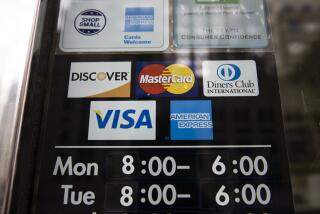Credit scores sink to new lows
- Share via
Battered by unemployment and tighter lending standards, the credit scores of millions of Americans are sinking to new lows.
About 25.5% of consumers — or 43.4 million people — had credit scores below 600 in April, according to FICO Inc. Historically, only about 15% of consumers — or 25.5 million — have had scores below that level, FICO said.
Consumers with low credit scores will have increased difficulty obtaining credit cards and other loans, said Christian deRitis, director of credit analytics at Moody’s Analytics.
A high national unemployment rate — 9.5% in June — has helped drive down scores, DeRitis said. “Delinquencies are on the rise. People out of work are not making payments on debts, and that negatively impacts their scores,” he said.
Many people also have high credit balances when compared with the total amount of credit available to them, DeRitis said. This trend, when combined with an inability to acquire more credit, has served as a “double-edged sword” for the economy, he said.
Those in the middle of the spectrum have also declined. Moderate credit scores, between 650 and 699, fell to 11.9% from a historical average of 15%.
The distribution of credit scores tends to shift during recessions, said Craig Watts, spokesman for FICO Inc. “Our experience has been that when a two-income family turns into a one-income family, people have to prioritize which bills to pay, and some bills aren’t paid,” Watts said.
As consumers have had difficulty getting more credit, the pace of the economic recovery has slowed.
“It’s a bit of a vicious cycle,” DeRitis said. “The threshold of good and bad credit has been raised as lenders rush to safety. That depresses spending, which negatively impacts the economy overall.”
On a bright note, the percentage of consumers with high scores of 800 or above has risen. Those with pristine records are at 17.9%, well above the historical average of 13%, although slightly down from the 18.7% in April 2008.
The economic downturn has made people more aware of how important it is to lower personal debt, DeRitis said. Those who are still employed and receiving regular paychecks have decreased spending and paid down loans, he said.
This trend will ultimately have long-term benefits for the economy, but short-term recovery will be sluggish.
“In the long run, it’s best to have consumers who are managing debts in a sustainable way,” DeRitis said, “unlike the boom-and-bust cycle we’ve seen in the past.”
But as unemployment nationwide continues to hover near 10% and unemployment insurance benefits run out for those out of work, the immediate outlook is gloomy.
“Until the labor market turns around, people will remain unable to pay bills,” DeRitis said. “Lowered consumption will only add extra friction to the economy.”
The calculation for FICO scores considers two factors: how consistently bills are paid and how much available credit is in use. Slow or delinquent payments and high amounts of debt result in lowered scores.
More to Read
Inside the business of entertainment
The Wide Shot brings you news, analysis and insights on everything from streaming wars to production — and what it all means for the future.
You may occasionally receive promotional content from the Los Angeles Times.











